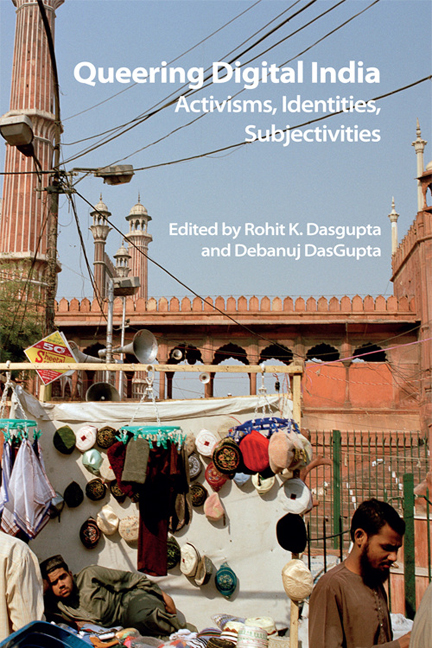1 - Introduction: Queering Digital India
Published online by Cambridge University Press: 28 April 2021
Summary
This book emerges out of the need for understanding the entanglements between digital technologies, nationalism, neoliberalism and sexual subjectivities in India. The present political conjuncture in India is marked by rise of the Hindu nationalist Bharatiya Janata Party (BJP). The economic policies of liberalisation, the welcoming of global capital and the establishment of technological hubs are interlaced with the promotion of an overtly Hindu, heterosexual, family-oriented vision of India. We will situate the emergence of digital technologies within this emergence of neoliberalisation, nationalistic visions of a digitally productive India and question how diverse Lesbian, Gay, Bisexual, Transgender, Koti, Hijra, Queer (LGBTKHQ) communities navigate the digital/national assemblage. In a word, the book is concerned with how a desire for an economically productive, Hindu India and desire for LGBTKHQ recognition inform each other. Queering is considered as a form of questioning dominant power-knowledge formations that work to construct normative ideas of gender, reproduction and the family. Recent scholars in queer theory have argued that queering (especially in the context of Asia), requires a geopolitical interrogation of the ‘impersonal, structural, and systemic workings of power’ (Liu 2015: 7). We take on diverse strands of queer theory in order to name the ways neoliberalism, nationalism, digital technologies and movements for queer rights converge with each other within present-day India. In this introduction, we will present key theoretical constructs that are being mobilised throughout the book by different authors. Our hope is to present a broad theoretical rubric for our readers, or a suggested road map for understanding how we approach sexuality politics, neoliberalism, Hindu nationalism and queer community formation in and through digital technologies. Queer signifies diverse kinds of desiring bodies, and regimes of truth that render certain kinds of desires as legible to the law, while some others as illegal or dangerous. Digital in this context indicates the various media networks through which desire circulates and takes on multiple meanings. Simultaneously, digital signifies the dominant desire (or a map) of the contested nation. Our introduction can be read as a genealogy of multiple desires, regimes of truth and how their emergence encodes itself in historically specific moments in India. After all, a truly specific understanding of bodies and desires require an understanding of the ‘context of the interrelationship between historically specific bodies’ (Butler 1987: 238).
- Type
- Chapter
- Information
- Queering Digital IndiaActivisms, Identities, Subjectivities, pp. 1 - 26Publisher: Edinburgh University PressPrint publication year: 2018



